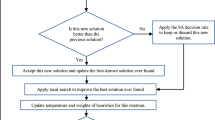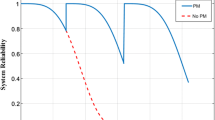Abstract
Heterogeneity among equipment in industrial production lines may have a major impact on energy consumption and makespan. The Supervisory Control Theory of discrete event systems proved to be especially useful to model the production system respecting its constraints and ensuring the safe execution on a real plant, such that an optimized production plan can be picked among the safe sequences. In this work, the makespan and the energy consumption minimization problem in discrete event systems with multiple production routes is addressed as a multi-objective problem. A multi-objective modeling is proposed, which considers the information regarding the power demanded by the system in each state of each equipment and the expected duration of each operation in the system. A dedicated Multi-Objective Variable Neighborhood Search (MOVNS) algorithm is also proposed to estimate an adequate set of trade-off solutions. A multi-criteria decision aid method is used to support the selection of an appropriate solution for the problem. The combination of the proposed modeling with both the MOVNS and a decision-making support has shown to be efficient regarding the solution of four test instances considered in this work.











Similar content being viewed by others
Notes
For simplicity, the elements of a five-tuple automaton that are not used in the definition are represented with underscore.
References
Abdeddaïm Y, Asarin E, Maler O (2006) Scheduling with Timed Automata. Theor Comput Sci 354(2):272–300
Al-Ahmari A (2016) Optimal robotic cell scheduling with controllers using mathematically based timed petri nets. Inf Sci 329:638–648. Special issue on Discovery Science
Almeder C, Mönch L (2011) Metaheuristics for scheduling jobs with incompatible families on parallel batching machines. J Oper Res Soc 62(12):2083–2096. https://doi.org/10.1057/jors.2010.186
Alves LVR, Bravo HJ, Pena PN, et al (2016) Planning on discrete events systems: A logical approach. In: 2016 IEEE International Conference on Automation Science and Engineering (CASE). pp 1055–1060. https://doi.org/10.1109/COASE.2016.7743520
Alves LVR, Pena PN, Takahashi RHC (2021) Planning on discrete event systems using parallelism maximization. Control Eng Pract 112:104813. 10.1016/j.conengprac.2021.104813. URL https://www.sciencedirect.com/science/article/pii/S0967066121000903
Baker KR, Trietsch D (2009) Principles of Sequencing and Scheduling, 1st edn. Wiley. https://doi.org/10.1002/9780470451793
Bui LT, Alam S, Bui LT et al (2008) Multi-Objective Optimization in Computational Intelligence: Theory and Practice (Premier Reference Source), 1st edn. IGI Global, Hershey
Cassandras C, Lafortune S (2008) Introduction to Discrete Event Systems, 2nd edn. Springer
Collette Y, Siarry P (2013) Multiobjective optimization: principles and case studies. Springer Science & Business Media
Costa TA, Pena PN, Takahashi RHC (2018) Sco-concat: a solution to a planning problem in flexible manufacturing systems using supervisory control theory and optimization techniques. J Control Autom Electr Syst 29:500–511
Cota LP, Guimarães FG, Ribeiro RG et al (2019) An adaptive multi-objective algorithm based on decomposition and large neighborhood search for a green machine scheduling problem. Swarm Evol Comput 51(1):100601
De Queiroz MH, Cury JE (2002) Synthesis and implementation of local modular supervisory control for a manufacturing cell. In: Sixth International Workshop on Discrete Event Systems, 2002. Proceedings. IEEE, pp 377–382
Ezpeleta J, Colom JM, Martinez J (1995) A Petri net based deadlock prevention policy for flexible manufacturing systems. IEEE Trans Robot Autom 11(2):173–184
Fang K, Uhan N, Zhao F, et al (2011) A new approach to scheduling in manufacturing for power consumption and carbon footprint reduction. J Manuf Syst 30(4):234–240. Selected Papers of 39th North American Manufacturing Research Conference
Friese R, Brinks T, Oliver C, et al (2012) Analyzing the trade-offs between minimizing makespan and minimizing energy consumption in a heterogeneous resource allocation problem. In: INFOCOMP, The Second International Conference on Advanced Communications and Computation. pp 81–89
Gao L, Pan QK (2016) A shuffled multi-swarm micro-migrating birds optimizer for a multi-resource-constrained flexible job shop scheduling problem. Inf Sci 372:655–676
Garey MR, Johnson DS (1980) Computers and intractability: A guide to the theory of NP-completeness. Bullet (New Series) Am Math Soc 3(2):898–904
Geiger MJ (2008) Randomised variable neighbourhood search for multi objective optimization. ar**v preprint ar**v:0809.0271 1–8
Ghallab M, Nau D, Traverso P (2004) Automated Planning Theory and Practice. Elsevier
Gomes HC, das Neves FdA, Souza MJF (2014) Multi-objective metaheuristic algorithms for the resource-constrained project scheduling problem with precedence relations. Comput Oper Res 44:92–104
He Y, Liu F, Hj Cao et al (2005) A bi-objective model for job-shop scheduling problem to minimize both energy consumption and makespan. J Cent South Univ Technol 12(2):167–171
Herzig A, de Menezes MV, de Barros LN, et al (2014) On the revision of planning tasks. In: ECAI 2014 - 21st European Conference on Artificial Intelligence, Prague, Czech Republic - Including Prestigious Applications of Intelligent Systems (PAIS 2014). pp 435–440
Kusiak A (2019) Fundamentals of smart manufacturing: A multi-thread perspective. Annu Rev Control 47:214–220. Cited By :14
Li X, **ng K, Zhou M et al (2019) Modified dynamic programming algorithm for optimization of total energy consumption in flexible manufacturing systems. IEEE Trans Autom Sci Eng 16(2):691–705. https://doi.org/10.1109/TASE.2018.2852722
López-Mellado E, Villanueva-Paredes N, Almeyda-Canepa H (2005) Modelling of batch production systems using Petri nets with dynamic tokens. Math Comput Simul 67(6):541–558
Lu C, Gao L, Li X et al (2017) Energy-efficient permutation flow shop scheduling problem using a hybrid multi-objective backtracking search algorithm. J Clean Prod 144:228–238
Malik R, Pena PN (2018) Optimal task scheduling in a flexible manufacturing system using model checking. In: 2018 14th International Workshop on Discrete Event Systems (WODES). pp 241–246
Mansouri SA, Aktas E, Besikci U (2016) Green scheduling of a two-machine flowshop: Trade-off between makespan and energy consumption. Eur J Oper Res 248(3):772–788
Martins LRR, Alves LVR, Pena PN (2017) Ultrades-a library for modeling, analysis and control of discrete event systems. Proc 20th World Congr Int Fed Autom Control 50(1):5831–5836
Miremadi S, Akesson K, Fabian M, et al (2008) Solving two supervisory control benchmark problems using supremica. In: 2008 9th International Workshop on Discrete Event Systems. IEEE, pp 131–136
Mladenović N, Hansen P (1997) Variable neighborhood search. Comput Oper Res 24(11):1097–1100
Mohajerani S, Malik R, Fabian M (2017) Compositional synthesis of supervisors in the form of state machines and state maps. Automatica 76:277–281
Pan QK, Tasgetiren MF, Suganthan P et al (2011) A discrete artificial bee colony algorithm for the lot-streaming flow shop scheduling problem. Inf Sci 181(12):2455–2468
Paryanto Brossog M, Bornschlegl M et al (2015) Reducing the energy consumption of industrial robots in manufacturing systems. Int J Adv Manuf Technol 78(5–8):1315–1328. https://doi.org/10.1007/s00170-014-6737-z
Pena PN, Costa TA, Silva RS et al (2016) Control of flexible manufacturing systems under model uncertainty using supervisory control theory and evolutionary computation schedule synthesis. Inf Sci 329:491-502
Pena PN, Vilela JN, Alves MRC et al (2022) Abstraction of the Supervisory Control Solution to Deal with Planning Problems in Manufacturing Systems. IEEE Trans Autom Control 67(1):344–350. https://doi.org/10.1109/TAC.2021.3053228
Pinedo ML (2012) Scheduling: Theory, Algorithms, and Systems, 3rd edn. Springer Publishing Company, Incorporated
Ramadge PJ, Wonham WM (1989) The control of discrete event systems. Proc IEEE 77(1):81–98
Saberi-Aliabad H, Reisi-Nafchi M, Moslehi G (2020) Energy-efficient scheduling in an unrelated parallel-machine environment under time-of-use electricity tariffs. Journal of Cleaner Production 249(2):119393
Schrijver A (1986) Theory of Linear and Integer Programming, vol 20. Wiley, New York
Wang J (2019) Algorithms for minimizing resource consumption over multiple machines with a common due window. IEEE Access 7:172136–172151
Wang S, Wang X, Yu J et al (2018) Bi-objective identical parallel machine scheduling to minimize total energy consumption and makespan. J Clean Prod 193:424–440
Wang W, Yuan C, **aobing L (2008) A fuzzy approach to multi-product mixed production job shop scheduling algorithm. In: Proceedings - 5th International Conference on Fuzzy Systems and Knowledge Discovery, FSKD 2008, pp 95–99. https://doi.org/10.1109/FSKD.2008.420
Zhang L, Wong T (2016) Solving integrated process planning and scheduling problem with constructive meta-heuristics. Inf Sci 340–341:1–16
Zhang L, Tang Q, Wu Z et al (2017) Mathematical modeling and evolutionary generation of rule sets for energy-efficient flexible job shops. Energy 138:210–227
Zhang L, Deng Q, Gong G et al (2020) A new unrelated parallel machine scheduling problem with tool changes to minimise the total energy consumption. Int J Prod Res 58(1):1–20
Zhu W, Tianyu L (2019) A novel multi-objective scheduling method for energy based unrelated parallel machines with auxiliary resource constraints. IEEE Access 7:168688–168699
Zitzler E, Thiele L (1999) Multiobjective evolutionary algorithms: a comparative case study and the strength Pareto approach. IEEE Trans Evol Comput 3(4):257–271
Acknowledgements
This work has been supported by the National Council for Scientific and Technological Development - CNPq under grant 443656/2018-5, CAPES, Brazil, Fapemig.
Author information
Authors and Affiliations
Corresponding author
Ethics declarations
Conflicts of interests
The authors declare that they have no conflict of interest.
Additional information
Publisher's Note
Springer Nature remains neutral with regard to jurisdictional claims in published maps and institutional affiliations.
Rights and permissions
Springer Nature or its licensor (e.g. a society or other partner) holds exclusive rights to this article under a publishing agreement with the author(s) or other rightsholder(s); author self-archiving of the accepted manuscript version of this article is solely governed by the terms of such publishing agreement and applicable law.
About this article
Cite this article
Alves, L.V., Rafael, G.C., Batista, L.S. et al. A multi-objective approach for manufacturing systems with multiple production routes based on supervisory control theory and heuristic algorithms. Discrete Event Dyn Syst 33, 373–394 (2023). https://doi.org/10.1007/s10626-023-00379-7
Received:
Accepted:
Published:
Issue Date:
DOI: https://doi.org/10.1007/s10626-023-00379-7




